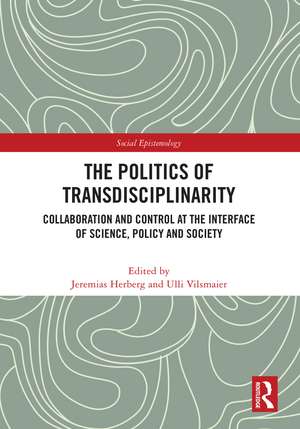The Politics of Transdisciplinarity: Collaboration and Control at the Interface of Science, Policy and Society
Editat de Jeremias Herberg, Ulli Vilsmaieren Limba Engleză Hardback – 6 sep 2024
The volume addresses the complexity of collaborative research at the interface of science, policy and society and sheds light on a common dilemma: researchers and their collaborators tackling issues that require political and knowledge-based control. At the same time, collaborative research that involves diverse publics is difficult to predict or regulate. By examining the interplay of power and knowledge in these collaborations, the book offers insights into how researchers navigate the dilemma of social and epistemic control. This exploration is crucial for understanding the politics of transdisciplinarity. Featuring contributions from various fields including transdisciplinary sustainability studies, science and technology studies, policy analysis, participatory research and more, the book discusses different methodologies, practices, theories, and adaptations in response to the control dilemmas inherent in collaborative research to offer a deeper understanding of the nuanced relationship between power and knowledge within collaborative research.
The Politics of Transdisciplinarity will be a key resource for the reflexive researcher working with collaborative approaches at the interface of science, policy and society. It was originally published as a special issue of Social Epistemology.
Preț: 980.44 lei
Preț vechi: 1195.66 lei
-18% Nou
Puncte Express: 1471
Preț estimativ în valută:
187.69€ • 193.03$ • 155.71£
187.69€ • 193.03$ • 155.71£
Carte tipărită la comandă
Livrare economică 20 februarie-06 martie
Preluare comenzi: 021 569.72.76
Specificații
ISBN-13: 9781032849683
ISBN-10: 1032849681
Pagini: 112
Dimensiuni: 174 x 246 mm
Greutate: 0.37 kg
Ediția:1
Editura: Taylor & Francis
Colecția Routledge
Locul publicării:Oxford, United Kingdom
ISBN-10: 1032849681
Pagini: 112
Dimensiuni: 174 x 246 mm
Greutate: 0.37 kg
Ediția:1
Editura: Taylor & Francis
Colecția Routledge
Locul publicării:Oxford, United Kingdom
Public țintă
Postgraduate, Undergraduate Advanced, and Undergraduate CoreCuprins
Introduction: Social and Epistemic Control in Collaborative Research – Reconfiguring the Interplay of Politics and Methodology 1. The Limits of Epistemic Control, the Powers of Actualization, and the Moral Economies of a Fictional Collective 2. Untrol: Post-Truth and the New Normal of Post-Normal Science 3. Designing a Transformative Epistemology of the Problematic: A Perspective for Transdisciplinary Sustainability Science 4. Navigating between Complexity and Control in Transdisciplinary Problem Framing: Meaning Making as an Approach to Reflexive Integration 5. Knowledge Decolonization à la Grounded Theory: Control Juggling in Research Situations 6. Identity Politics: Participatory Research and its Challenges Related to Social and Epistemic Control 7. The Phase Zero: Why Collaborative Research is Not Co-Designed but Scripted
Notă biografică
Jeremias Herberg is a sociologist and practitioner at the interface of environmental politics and research. He heads the presidential department of the German Environment Agency and held a visiting professorship at Ruhr University Bochum, Germany. He publishes broadly on social dimensions of sustainability. He co-founded the Journal of Political Sociology.
Ulli Vilsmaier is a geographer by training and specialized in inter- and transdisciplinary research and higher education. Her research focuses on designing, accompanying, implementing and evaluating boundary-crossing research and on methods for boundary work and integration. She has significant international experiences with research development and transformations of academic institutions.
Ulli Vilsmaier is a geographer by training and specialized in inter- and transdisciplinary research and higher education. Her research focuses on designing, accompanying, implementing and evaluating boundary-crossing research and on methods for boundary work and integration. She has significant international experiences with research development and transformations of academic institutions.
Descriere
This book discusses collaborative research as both a product of social and epistemic control, and as a process of dealing with it. It offers fresh multi-disciplinary perspectives on old questions that are gaining new urgency with the rise of participatory, transdisciplinary and transformative research.
